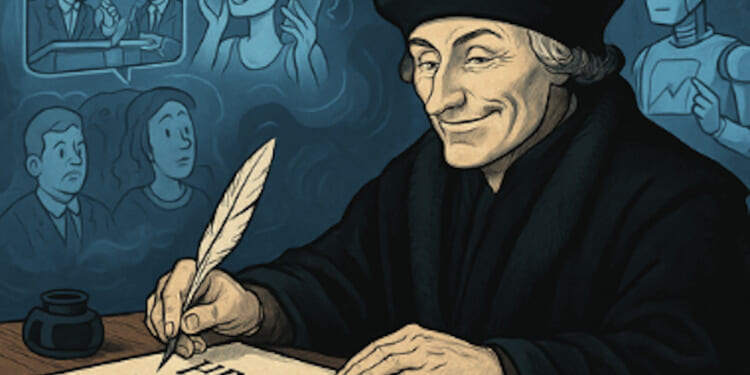Ever feel like the world’s gone mad, idiocy reigns, and the wise are mocked? Every day, you say?
Well then, welcome! You’re living in Desiderius Erasmus’s world. Only 500 years later.
Erasmus of Rotterdam (1466–1536) was the original intellectual troublemaker — the man who used humor, reason, and razor-sharp Latin to mock the stupidity of his age while trying to save it from itself.
Born illegitimate in a turbulent Europe dominated by superstition, corruption, and war, Erasmus rose from obscurity to become the most celebrated scholar of the Northern Renaissance. And he did it not by preaching revolution, but by wielding irony like a scalpel.
He studied under the Brethren of the Common Life — a pious, bookish community that emphasized personal faith over pompous ritual — and quickly decided that the Church’s obsession with form had strangled its spirit.
Ordained as a priest, he promptly fled the cloister for a life of letters, arguing that the true path to God lay not through blind obedience, but through understanding, compassion, and education. Erasmus didn’t just want to reform theology — he tried to reform thinking itself.
The Satirical Medieval Bestseller
His masterpiece, In Praise of Folly (1509), is a dazzling work of satire that still bites today. Written during a stay with his friend Thomas More (yes, that Thomas More), the book personifies Folly herself — a goddess who gleefully celebrates human stupidity.
Through her monologue, Erasmus mocks priests who worship power instead of God, scholars who split hairs while missing the point, and politicians who mistake cunning for wisdom.
What makes it timeless isn’t just the humor, but the moral courage behind it. Erasmus had the nerve to tell Europe’s most powerful men that they were fools — and then convinced them to laugh along.
Folly sold out across the continent, translated, pirated, and debated in every major university. It became the Renaissance’s version of a viral post — with a conscience.
In today’s world, where social media rewards outrage and conformity, The Praise of Folly feels eerily prescient. Erasmus understood that human stupidity isn’t cured by censorship or ideology — only by self-awareness. The moment we stop laughing at ourselves, we become dangerous.
The Humble Humanist
Erasmus wasn’t just a satirist. He was also the first great modern humanist — and the most reluctant revolutionary in history.
When that damn Augustinian Martin Luther nailed his theses to the church door, Erasmus agreed with many of his criticisms… but refused to join the rebellion. Erasmus quipped, “I laid the egg that Luther hatched, but I wanted a different bird.”
Instead of zealotry, he offered moderation; instead of dogma, dialogue.
He produced a revolutionary Greek-Latin edition of the New Testament, painstakingly restoring the text to what he believed were its original meanings.
His goal? To let ordinary people encounter Christ’s words without the filter of a corrupt clergy or political agenda. It was the scholarly equivalent of handing the Bible back to the people; it was a quiet intellectual rebellion that changed Christianity forever.
But his refusal to choose sides in the Reformation made him enemies on all fronts. The Protestants accused him of cowardice; the Catholics of heresy.
The truth? He simply loved reason too much to abandon it to fanaticism. “I am a citizen of the world,” he wrote, “and I call no place my home but the world itself.” That cosmopolitan spirit — borderless, curious, and humane — feels more radical now than it did in 1516.
Wrap Up
If Erasmus were alive today, he’d be throttled by algorithms, canceled for nuance, and shadowbanned for satire. Yet his voice is precisely what we need.
He believed laughter could be a weapon against tyranny. We should humbly pursue truth, not brutally enforce it. That education should free the mind, not indoctrinate it.
We’re living in an age where every ideology thinks it’s infallible — where folly once again sits on the throne. But Erasmus would tell us to put down the pitchforks, pick up the books, and learn to laugh again.
His Praise of Folly 2.0 might feature influencers instead of friars, bureaucrats instead of bishops, and politicians tweeting in Latin. But the lesson would remain the same: The world is full of fools — and the greatest folly of all is thinking you’re not one of them.
In an era obsessed with outrage, Erasmus offers the rarest commodity of all: sanity. And that’s worth praising.















